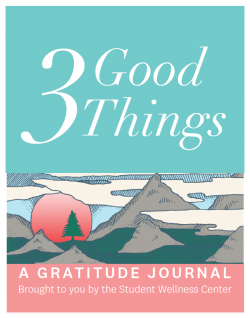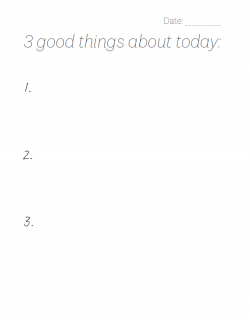Gratitude Journaling
Gratitude journaling is a simple practice that can shift our attention toward the good things that are already present in our lives. The SWC makes printed journals available to the campus (you can pick one up from our Berry 179 suite), but you don't need one to get started. Just choose a notebook, a piece of paper, or download the page template below and try making gratitude a daily part or your routine!
gratitude_journal_instructions.png
gratitude_journal_template.png
As we go through our lives, it's easy to give all of our attention to the things we wish were different. Sometimes we need to focus on things we want or need to change, but if this becomes our sole focus, it can become easy to take the good things that are already present in our lives for granted. When this happens, we can overlook the people and experiences that can bring us feelings of gratitude and connection.
When we take the time to remember and list three positive things that occurred each day, we connect more deeply with sources of goodness in our lives. When we make this a habit, it can change our moods and how we feel, which is why this practice is associated with significant increase in happinesT
To try this for yourself, set aside 5-10 minutes each day (often people do this right before they go to sleep at night) to remember and record three things that went well for you that day. They can be relatively small or large in importance. As you write, consider the following;
Step 1: Write a brief description of each event (e.g., "a professor complimented my work on an assignment", "someone at Collis smiled and told me to have a good day").
Step 2: Reflect on this event and remember it in as much detail as possible, including what happened, how you felt at the time and how you feel now as you remember it. Take 1-2 minutes to reconnect with these feelings.
Step 3: Consider why each event occurred. What made these things happen in your life?

